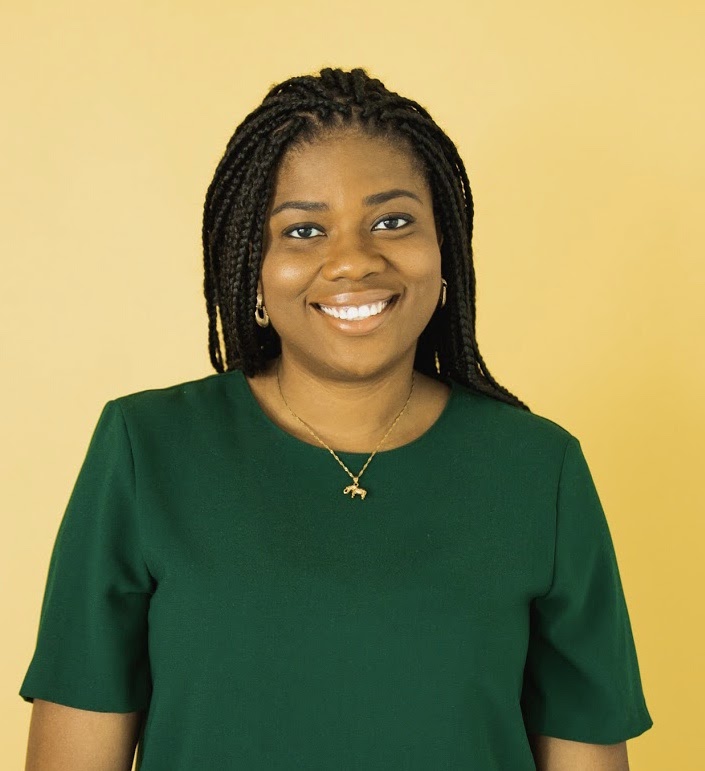Meet Chi-Chi Egbo, an AHF mentor since our inception in 2019!
A career strategist and coach, leader, mentor and speaker, Chi-Chi has more than eight years of experience helping individuals, teams and companies achieve incredible goals. Specializing in career pivots and transitions, her expertise lies in strategy, career services, partnership development, curriculum design and coaching. Chi-Chi is Director of Outcomes (Career Services) at Juno College and responsible for one of Juno’s most important metrics: employment rates of bootcamp graduates. Known for her positivity, ideas and strategic thinking, Chi-Chi has developed award-winning career development programs and managed initiatives that have delivered impactful results for businesses, clients and students.
Chi-Chi cares deeply about creating inclusive spaces and workplaces, preparing people for the future of work, reciprocal mentorship and making real change within an organization. Having served as a mentor at AHF’s 2019 summit and the Winter and Summer 2021 Fellowship Circles, we are deeply honoured to sit with Chi-Chi and learn more about her perspectives as a change leader!
Surround Yourself with a Supportive Community
As a Career Strategist Chi-Chi Egbo wholeheartedly recognizes the value of having a network of people to support and guide you throughout your career. As a long-time supporter of Accelerate Her Future, Chi-Chi believes that AHF is more than a network. As a mentor in AHF’s Fellowship Circle, Chi-Chi shares how from her experience mentors and fellows feel safe to share their experiences and learn from one another because they see themselves represented in the room. She adds, “AHF’s mission is underpinned with intention, purpose and inclusion which makes it a community of change”.
Chi-Chi strongly believes that BIWOC professionals should have access to a supportive community and why she has served as a mentor at AHF since 2019. She remembers her career journey and where she was over a decade ago, she recalls feeling isolated and frustrated at several points when navigating the workplace challenges mostly on her own.
She recalls a mentor (and the first woman of colour manager Chi-Chi reported to) once told her “
If you’re going to stand on the side of the right, be prepared to stand alone”. Chi-Chi adds, “This advice was in reference to never being afraid to stand up for what I believe in, even if others don’t agree with me.”
While this advice taught Chi-Chi the importance of self advocacy and standing up for what she believes in, it also inadvertently resulted in her figuring things out on her own. “And that’s not okay. We don’t have to do it alone, and this is why access to a supportive community is so important.”
Career Planning Requires Knowing Your Why and What
Chi-Chi is passionate about helping people with their careers in a holistic and human-centred way. Her advice is to always start with reflection to determine your
why and your
“what. She suggests beginning with narrowing in on why you are interested in changing careers. “The reasons vary for everyone, but it’s crucial to know your why to guide your journey.”
She adds that it is important to reflect on your
what too. “This is where you will uncover what you like to do, what you don’t like, what you are great at, what you want to be better at and most importantly what your values are.”
She advises pairing these reflections with online self-assessments such as Gallup Strengths Finder, 16 Personalities or Plum. Chi-Chi encourages researching careers that align with your reflections and values.
She also recommends researching job titles, companies, salaries and LinkedIn profiles of people who are already in the field. Connecting with people who are in your desired roles for coffee chats and informational interviews will provide you with further clarity, industry insight and direction. Whether you meet with people in your network or those you may not know, she believes that sitting down with someone for 30 minutes to gather information will help with the decision making process of career planning.
She adds, “Participate in community groups like AHF, Monday Girl, BPTN, student clubs, or associations where you can access a community of support and like-minded individuals.” Immersing yourself in these groups makes it easier to find individuals who can relate to your experience and background. More often than not, different opportunities are shared in these spaces and increases the likelihood of you meeting someone who could eventually refer you for a job.
Stepping Out of Your Comfort Zone
Putting yourself out there is uncomfortable. Chi-Chi advocates for believing in yourself, facing the unknown, and taking a leap of faith.
“Don’t be afraid to step out of your comfort zone and pursue a path that might be a bit muddy because that’s when you’ll realize your potential and learn your true capabilities.”
Imposter thoughts can rear their head in career planning, adding to self-doubt. A notable takeaway Chi-Chi made from one of the Fellows in AHF’s Fellowship Circle winter cohort is to stop and ask yourself three questions (We love the power of reciprocal mentoring!):
- What are the standards I’m holding myself to and how are they measured?
- Why do I feel like I need to hold myself to these standards?
- Are these standards realistic?
Chi-Chi found that having this easy and tangible strategy in her toolkit made it easier to navigate imposter thoughts.
Hope for the Future of More Inclusive Workplaces
When Chi-Chi was asked to think about her hopes for the future when it comes to early-career BIWOC in workplaces, she was excited about early-career BIWOC seeing themselves in leadership roles in the future. “Though we’re far from where we need to be, I believe young BIWOC are seeing more representation and know it’s possible for professionals who look like them to be outstanding leaders in the workplace.”
Chi-Chi views programs like AHF are doing their part and adds that while there is progress being made, the AHF’s of the world can’t do it alone. “We need more tech companies to redesign their workplaces, especially their hiring practices and cultures. The best way to ensure the success of future BIWOC leaders is creating spaces where they are unequivocally included and belong.”



